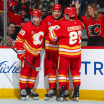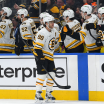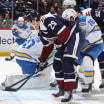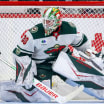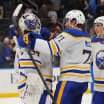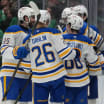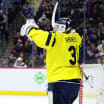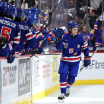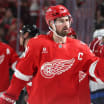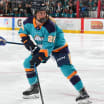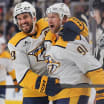Hossa's journey to Hall of Fame defined by consistency, reliability
Former teammates, coach praise forward, three-time Stanley Cup winner for defense, strength on puck
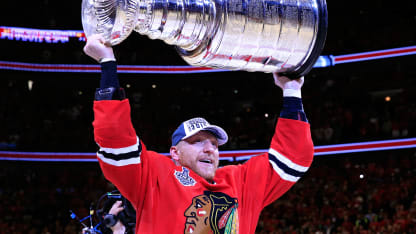
© Tasos Katopodis/Getty Images
"I was 13 years old," Hossa said in Trencin, Slovakia, on Nov. 2. "I just took a picture of the Stanley Cup."
The former NHL forward returned as one of the Class of 2020 inductees. Hossa, Jarome Iginla, Kevin Lowe, Doug Wilson, Ken Holland and Kim St-Pierre were inducted into the Hall of Fame on Monday.
The 42-year-old was a first-ballot election.
RELATED: [Hossa understood two-way hockey during Hall of Fame career, Olczyk says]
"I was surprised about how quick they chose me," Hossa said. "I know there are a lot of great names still waiting and they preferred me. It is a really great honor for me, and I appreciate it very much. I think I will fully realize all that when I get to [Toronto]."
The No. 12 pick by the Ottawa Senators in the 1997 NHL Draft, Hossa scored 1,134 points (525 goals, 609 assists) in 1,309 games for the Senators, Atlanta Thrashers, Pittsburgh Penguins, Detroit Red Wings and Chicago Blackhawks. A progressive skin disorder ended his hockey career after the 2016-17 season.
He won the Stanley Cup with the Blackhawks in 2010, 2013 and 2015. He also reached the Stanley Cup Final with the Penguins in 2008 and the Red Wings in 2009, the only player to play in the Cup Final in three straight seasons with three different teams.
"It's consistency, right?" said Arizona Coyotes forward Andrew Ladd, who won the Stanley Cup with Hossa in 2010 and was his Blackhawks teammate again in 2016. "He was such a consistent player for so many years; you'd have to be to put up the numbers that he has. It's easy to look at a guy's numbers and say, 'You put up offensive numbers as a Hall of Famer.' But to be able to have the impact defensively and offensively and do that for as many years as he did, it's something."
Hossa made his NHL debut with the Senators against the Montreal Canadiens on Oct. 1, 1997. He scored his first NHL point 11 days later, a secondary assist on Randy Cunneyworth's goal in a 7-4 loss to the Los Angeles Kings. He played most of the 1997-98 season for Portland of the Western Hockey League, scoring 85 points (45 goals, 40 assists) in 53 games, and became a staple in the Senators lineup during the 1998-99 season with 30 points (15 goals, 15 assists) in 60 games.
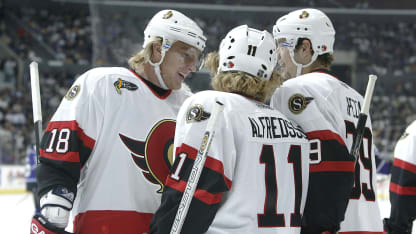
© Jeff Gross/Getty Images
"He was special from the beginning," former Senators forward Daniel Alfredsson said. "My personality is similar to his, so we got along really well. We created a very healthy competition between us, both being right wingers, both being team-first players. We helped push each other through the times we had together and always tried to one-up each other coming into camp, who was in better shape. On a very good level, too. We pushed each other but we were happy when the other had success.
"We played a very defensive style when he came to us. I'm not sure he loved that all the time, but he never complained about it. We weren't a great team when he came, but he helped us become one of the better teams in the League. If he would've come to a really good team right away and they played more offensively, his numbers would've been even better. But he didn't complain, he knew team success makes everyone look good and he just did what he had to do."
Though Hossa's production remained consistent with 80 points (45 goals, 35 assists) in 80 games in 2002-03 and 82 points (36 goals, 46 assists) in 81 games in 2003-04, former Senators goalie Patrick Lalime said he appreciated his dedication to defense.
"If I can find 20 players like that, I would," said Lalime, an NHL analyst for TVA Sports. "He had a very good hockey sense; he could read off plays. Even in our own end he was strong on the wall. He could get the puck out all the time. Just little things that made him such an appreciated player from what he was doing on the ice, little details in his game that not everybody pays attention to, he was doing. He was that good."
Former teammates said they recall certain trademarks to Hossa's game. One was how he separated himself from defenders.
"He would skate a straight line to the defenseman and he would put the puck at his feet right there and the defenseman put his head down for a second, if he wasn't looking, boom, he was gone, and he was alone," Lalime said. "He impressed me a lot. Not that he had a great shot or anything. He had a great wrist shot, not a great slap shot. But he had very good hands and his speed to me was unbelievable. When he reached center ice, when he took off, you couldn't stop him."
Hossa's other talent was keeping the puck away from defenders, be it against his own teammates in battle drills or the opposition. Former NHL defenseman Shane Hnidy, who played with Hossa with the Senators and Thrashers, remembers Hossa's strength on the puck.
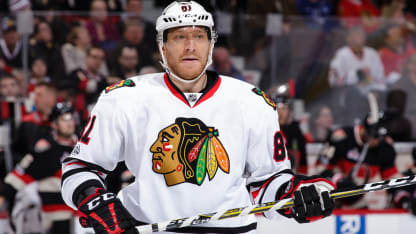
© Jana Chytilova/Freestyle Photo/Getty Images
"He was one of those players who could do a lot with one hand on the stick," said Hnidy, a color commentator for the Vegas Golden Knights. "I don't know if that's going to make sense, but when you watched when he played, he didn't need two hands, just one hand on a stick. You'd use two hands because maybe you get a little more pull, you can lean on it. He needed one hand and his body to shield, protect the puck. You weren't getting to it."
The Senators traded Hossa and defenseman Greg de Vries to the Thrashers for forward Dany Heatley on Aug. 23, 2005. Hossa would have his most productive seasons with Atlanta, scoring 92 points (39 goals, 53 assists) in 80 games in 2005-06 and an NHL career-high 100 points (43 goals, 57 assists) in 82 games in 2006-07, helping the Thrashers make the Stanley Cup Playoffs for the only time in their history before they relocated to become the Winnipeg Jets in 2011.
Bob Hartley, coach of Avangard Omsk in the Kontinental Hockey League, was Hossa's coach with the Thrashers for five seasons (2005-08). He said his maturity level helped him during the transition from Ottawa to Atlanta.
Read more in Slovak: [Senators teammates reminisce about Hossa]
"He was obviously a top three forward on our team and playing penalty kill, 5-on-5, power play, offensive zone responsibilities, defensive zone responsibilities," Hartley said. "When you say the word reliable, I think you that need to think about Marian Hossa right away.
"He understood the game. In the video room, you can dissect the game any way you want. You can press pause for 10 minutes and the game is easy. But when you get on the ice, there's no pause or rewind button. It's go, go, go and his hockey sense, the way that he could read the play, it made him an all-star player. More than an all-star player. For me, in my book, he was a franchise player."
On Feb. 26, 2008, the Thrashers traded Hossa and forward Pascal Dupuis to the Penguins for forwards Erik Christensen and Angelo Esposito and a first-round pick in the 2008 NHL Draft. Hossa reached the Stanley Cup Final with the Penguins, who lost the best-of-7 series to the Red Wings in six games. Hossa declined to re-sign with the Penguins and signed a one-year contract with Detroit on July 2, 2008 but came up empty in his second consecutive trip to the Final, when the Penguins defeated the Red Wings in seven games to win the 2009 Cup.
"It could be different circumstances if I sign in Pittsburgh and now they probably couldn't sign some other players and they would be different team," Hossa said after Game 7 in 2009. "So we could sit here for hours discussing this, but it could be a different team, could be different things, so I don't regret the decision."
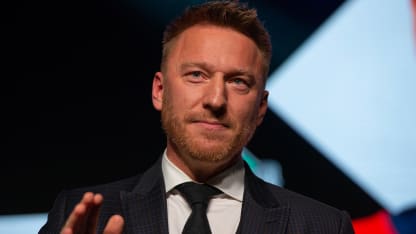
© RvS.Media/Monika Majer/Getty Images
The Blackhawks signed Hossa to a 12-year contract July 1, 2009. They lost the Western Conference Final to the Red Wings the previous season and were loaded with young talent like forwards Jonathan Toews and Patrick Kane, and defensemen Duncan Keith and Brent Seabrook, and were ready to take the next step.
"He was a special player who, you talk about the generational talent that you only see every 10 years, I feel he's right on the edge of that, if not (that)," Toews said. "For me, to have a chance to play with him on a line for so long, you definitely appreciate looking back on that, and seeing how much fun and how easy the game was, how much he supported you in so many different ways.
"All that being said, as a player, he was just a great person and a great teammate. He was kind of like that older guy that guys like me and 'Kaner' looked up to. He never seemed to be rattled, never seemed to be frustrated. Just always calm and had that calm form of leadership where he was just himself every single day. He led by example every day."
The third consecutive Final appearance in 2010 would be the charm for Hossa, when the Blackhawks defeated the Philadelphia Flyers in six games to win their first Stanley Cup championship in 49 years. For those who had seen Hossa's previous two losses in the Final, it was a relief to see him break through.
"You pull for those players, because when they're on your team, you know that he emptied his pocket every day for the Thrashers," Hartley said. "For me to look at his career and to see the success that he got in Chicago, I think it was just well deserved. It's like the hockey gods said, 'We have to reward this player.' There are so many great players who finish their career, and they don't win the Cup. For 'Hoss,' I think it was just a matter of time. Everything fell in the right place and he was a big, big part for the Chicago Blackhawks."
Hossa played for the World Legends in the adidas Hockey Hall of Fame Legends Classic at Scotiabank Arena in Toronto on Nov. 14. It was the first time he wore his hockey gear since he had to quit the game four years ago, and was one more chance to show those skills that got him to the Hall.
"I started prepping on the ice with my brother (Marcel Hossa), we skated three times about 40 minutes each and I started to enjoy all that again," Hossa said. "It was weird for me to put on the skates after such a long time. I have to say ski boots are more comfortable. But I found my groove quite quickly."
NHL.com/cs independent correspondent Michael Langr contributed to this report
